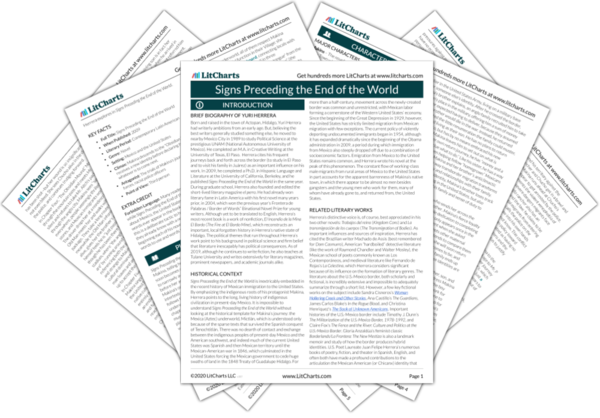Verse (“Jarchar”) Quotes in Signs Preceding the End of the World
When she reached the top of the saddle between the two mountains it began to snow. Makina had never seen snow before and the first thing that struck her as she stopped to watch the weightless crystals raining down was that something was burning. One came to perch on her eyelashes; it looked like a stack of crosses or the map of a palace, a solid and intricate marvel at any rate, and when it dissolved a few seconds later she wondered how it was that some things in the world—some countries, some people—could seem eternal when everything was actually like that miniature ice palace: one-of-a-kind, precious, fragile. She felt a sudden stab of disappointment but also a slight subsiding of the fear that had been building since she’d versed from home.
The city was an edgy arrangement of cement particles and yellow paint. Signs prohibiting things thronged the streets, leading citizens to see themselves as ever protected, safe, friendly, innocent, proud, and intermittently bewildered, blithe, and buoyant; salt of the only earth worth knowing. They flourished in supermarkets, cornucopias where you could have more than everyone else or something different or a newer brand or a loaf of bread a little bigger than everyone else’s. Makina just dented cans and sniffed bottles and thought it best to verse, and it was when she saw the anglogaggle at the self-checkouts that she noticed how miserable they looked in front of those little digital screens, and the way they nearly-nearly jumped every time the machine went bleep! at each item. And how on versing out to the street they sought to make amends for their momentary one-up by becoming wooden again so as not to offend anyone.
Scum, she heard as she climbed the eighth hill from which, she was sure, she’d catch sight other brother. You lookin to get what you deserve, you scum? She opened her eyes. A huge redheaded anglo who stank of tobacco was staring at her. Makina knew the bastard was just itching to kick her or fuck her and got slowly to her feet without taking her eyes off him, because when you turn your back in fear is when you’re at the greatest risk of getting your ass kicked; she opened the door and versed.
Over the door was a sign that said Verse. She tried to remember how to say verse in any of her tongues but couldn’t. This was the only word that came to her lips. Verse.












